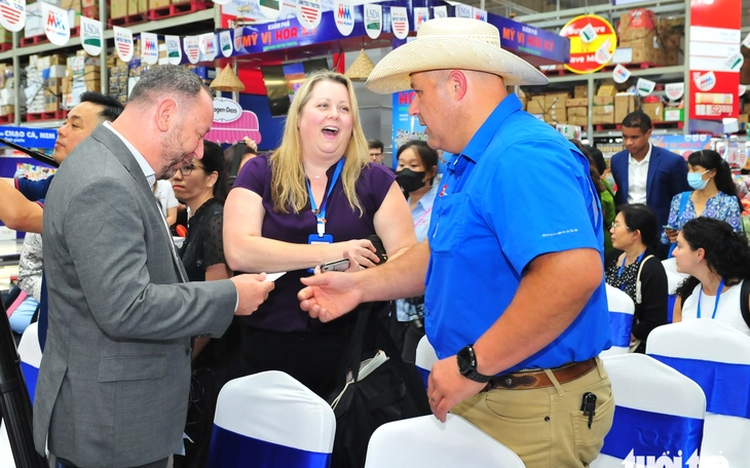
A delegation of U.S. enterprises promote products in the Vietnamese market. Photo: N.Binh / Tuoi Tre
AmCham told the press on Thursday that it had actively lobbied for the tariff suspension, calling it a necessary step to give U.S. and Vietnamese businesses time to prepare for and adapt to the proposed new tariffs.
The U.S. business community sees the delay as a tactical retreat. The postponement is regarded as a “necessary buffer,” allowing both countries' businesses to adjust supply chains and jointly build a fairer, more balanced, and long-term trade road map.
According to AmCham, Vietnam’s proactive and constructive dialogue with the U.S.—especially commitments to reduce tariff and non-tariff barriers to narrow its trade surplus with the U.S.—is the right direction.
Vietnamese policymakers have been praised for their patience and pragmatic approach throughout the process.
However, AmCham acknowledged that challenges still lie ahead. The 10-percent tariff remains pending, not to mention the already imposed 25-percent tariffs on steel and aluminum.
The U.S. administration’s description of this delay as a pause rather than an end is a reminder that the tariff policy remains under negotiation. All parties involved should make the most of this time to address substantial trade bottlenecks.
During this suspension period, AmCham expects to closely coordinate with the Vietnamese government and the business community to identify and eliminate trade barriers.
With over 550 companies and 2,000 individual members, AmCham is one of the largest business associations in Vietnam, representing the voice of U.S. enterprises in the Southeast Asian country.
“We are committed to working with all stakeholders to build a freer, fairer, more efficient, and predictable trade environment,” AmCham stated.
Right after U.S. President Donald Trump announced a 46-percent retaliatory tariff on Vietnam on April 2, AmCham called on the U.S. government to consider implementing a transitional period rather than applying the tariffs immediately.
This period would allow businesses of both sides to adapt to new regulations, minimize unnecessary disruptions and financial damage, and avoid unwanted negative impacts.
In the early hours of Thursday (Vietnam time), U.S. President Donald Trump announced on Truth Social “a 90-day PAUSE, and a substantially lowered reciprocal tariff during this period, of 10%” for more than 75 countries that have called Representatives of the United States, including the Departments of Commerce, Treasury, and the United States Trade Representative, to negotiate a solution to the subjects being discussed relative to trade, trade barriers, tariffs, currency manipulation, and non-monetary tariffs, and have not retaliated in any way, shape, or form against the U.S..
Trump also announced his decision to immediately jack up the tax rate on Chinese imports to 125 percent.
Spokesperson of the Vietnamese Ministry of Foreign Affairs Pham Thu Hang later said that Vietnam views the U.S. decision to pause reciprocal tariffs for 90 days on exports from other countries, including Vietnam, as a positive step.


Max: 1500 characters
There are no comments yet. Be the first to comment.